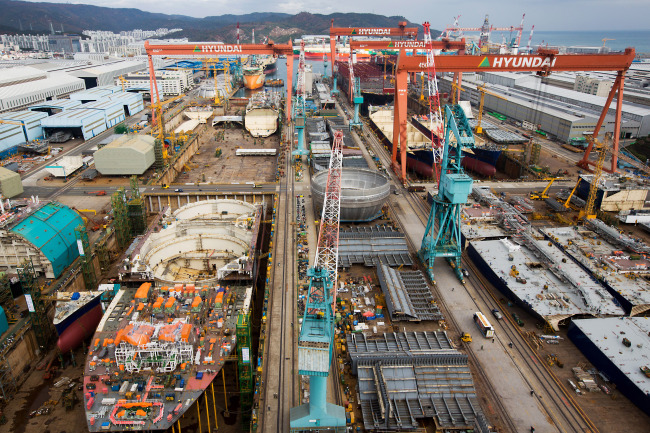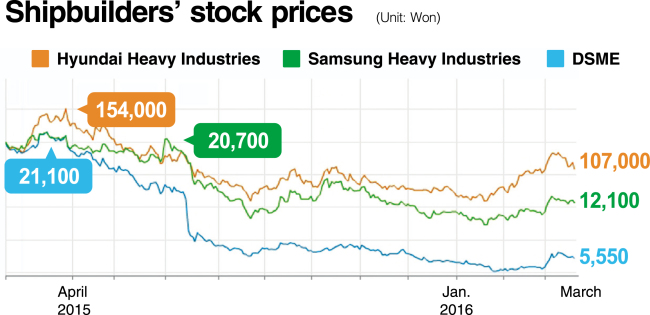[KOSPI Watch] Korean shipbuilders in difficulty amid slowdown
By 박형기Published : March 21, 2016 - 14:38
It seems like yesterday that Korea’s shipbuilding trio conquered the world, leading in the number of contracts and orders they secured with well-known shipping companies to build container ships and LNG and bulk carriers.
If that was not enough, Korean shipbuilders, whose exports of those ships used to account for more than 8 percent of the total exports starting in the 1980s, ventured into supplying materials and equipment to offshore energy plants and platforms that looked highly “lucrative and synergistic” with their core shipbuilding operations.
If that was not enough, Korean shipbuilders, whose exports of those ships used to account for more than 8 percent of the total exports starting in the 1980s, ventured into supplying materials and equipment to offshore energy plants and platforms that looked highly “lucrative and synergistic” with their core shipbuilding operations.

But now with the onslaught of a global economic slowdown, fiscal austerity and unorthodox credit easing, luck seems to have run out for the trio – Hyundai Heavy Industries, Samsung Heavy Industries and Daewoo Shipbuilding & Marine Engineering – and 20 other listed shipbuilders and equipment-makers.
Saddled with accumulated losses of over 7 trillion won amid a series of earnings shocks following suspensions of global shipbuilding and offshore projects, the Korean trio leading the shipbuilding index has been on a downward spiral since 2014.
There are more than 320 ships lying idle, accounting for over 6 percent of total ships globally, according to Shinhan Investment and Lloyd’s List.
“Oversupply and weakening demand are increasing the number of idle ships,” said Kim Hyun, an analyst at Shinhan Investment.

With some 20 Korean shipbuilders and related equipment-makers listed on the KOSPI, they saw their shares decline more than 1 percent on average last week. This stands in contrast to the 1.1 percent increase on the KOSPI 200, which tracks 200 most liquid shares on the main bourse.
The Baltic Dry Index, measuring global trades of raw materials, is down, the won-dollar exchange is becoming more volatile and China just recently lowered its 2016 growth forecast to 6.5 percent.
“There isn’t any good news coming either from shipbuilders or shipping companies as they enter fiscal 2016,” said Kim Hong-gyun, an analyst at Dongbu Securities.
“The market can see some hope of shipbuilders securing orders from Middle Eastern countries including Iran, and Europe’s liquidity making its way into the shipping sector. But it will take some time to see these effects.”
Worse still, Japanese shipbuilders, which once dominated the world, are rapidly returning to their former glory, while Chinese shipbuilders are rising on the heels of Korean shipbuilders. Hyundai, Samsung and Daewoo are no longer the “global trio,” according to data by Clarksons Research.
Japan’s Imabari Shipbuilding brushed past Samsung Heavy to become the world’s third-largest shipbuilder with global orders to build 224 ships over Samsung’s 101 ship orders as of the end of February.
Imabari’s Japanese counterpart Japan Marine United entered the global top 10 after securing orders to build 73 ships as of last month.
Meanwhile, Korea’s largest shipbuilder Hyundai Heavy secured orders of 204 ships, or 8.8 compensated gross tons, and Daewoo Shipbuilding has orders of 139 ships, or 8.4 CGTs.
What is noticeable is that Chinese shipbuilders, including Yangzijiang Shipbuilding and Shanghai Waigaoqiao Shipbuilding are making a name for themselves with technology and services in the global market. Yangzijiang ranked 5th as it secured 130 ship orders, while Waigaoqiao came in 7th with 74 ship orders.
Clarksons pointed out in its report that Korea’s three shipbuilders faced with losses, in addition to Sungdong Shipbuilding & Marine Engineering reporting massive losses, are in a “difficult” situation.
Analysts say it is imperative for Korean shipbuilders to improve their fundamentals before seeing an increase in their valuations, as investors are currently approaching the sector very “conservatively.”
(hkp@heraldcorp.com)








![[Graphic News] More Koreans say they plan long-distance trips this year](http://res.heraldm.com/phpwas/restmb_idxmake.php?idx=644&simg=/content/image/2024/04/17/20240417050828_0.gif&u=)
![[KH Explains] Hyundai's full hybrid edge to pay off amid slow transition to pure EVs](http://res.heraldm.com/phpwas/restmb_idxmake.php?idx=644&simg=/content/image/2024/04/18/20240418050645_0.jpg&u=20240419100350)





![[From the Scene] Monks, Buddhists hail return of remains of Buddhas](http://res.heraldm.com/phpwas/restmb_idxmake.php?idx=652&simg=/content/image/2024/04/19/20240419050617_0.jpg&u=20240419175937)

![[KH Explains] Hyundai's full hybrid edge to pay off amid slow transition to pure EVs](http://res.heraldm.com/phpwas/restmb_idxmake.php?idx=652&simg=/content/image/2024/04/18/20240418050645_0.jpg&u=20240419100350)

![[Today’s K-pop] Illit drops debut single remix](http://res.heraldm.com/phpwas/restmb_idxmake.php?idx=642&simg=/content/image/2024/04/19/20240419050612_0.jpg&u=)